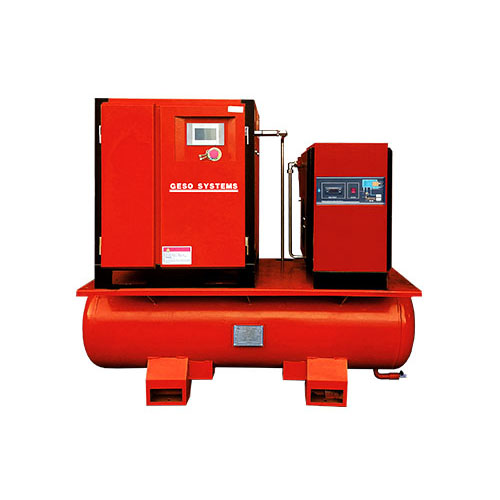Overview of Oil-Injected Screw Air Compressors
2024-05-24
An oil-injected screw air compressor is a type of rotary compressor that utilizes oil for lubrication, cooling, and sealing purposes. These compressors are widely used in industrial applications due to their efficiency, reliability, and ability to provide a continuous supply of compressed air. Here’s a detailed look at oil-injected screw air compressors:
Overview of Oil-Injected Screw Air Compressors
1. Operation Principle:
- Rotary Screw Mechanism: Consists of two interlocking helical rotors (screws) that compress air as they rotate.
- Oil Injection: Oil is injected into the compression chamber to lubricate the screws, seal gaps, and help dissipate heat generated during compression.
2. Components:
- Air End: The main compression unit where air is compressed by the rotating screws.
- Oil Separator: Removes oil from the compressed air.
- Oil Filter: Ensures the circulating oil is free of contaminants.
- Cooler: Cools the compressed air and oil mixture to manageable temperatures.
- Control System: Regulates the compressor operation, including pressure and temperature controls.
Key Features
1. Efficiency:
- Continuous Operation: Capable of running continuously, making them suitable for demanding industrial applications.
- High Efficiency: Provides a high volume of compressed air with relatively low energy consumption.
2. Reliability:
- Durability: Designed to withstand heavy-duty use and long operating hours.
- Low Maintenance: Requires less frequent maintenance compared to other types of compressors due to the robust construction and efficient lubrication.
3. Performance:
- Stable Pressure: Maintains a consistent pressure output, which is crucial for applications requiring steady airflow.
- Cooling: The injected oil effectively cools the compressor, preventing overheating and ensuring efficient operation.
Applications
1. Manufacturing:
- Assembly Lines: Provides a reliable source of compressed air for pneumatic tools and equipment.
- Machinery Operation: Used to power various types of machinery in manufacturing plants.
2. Automotive:
- Paint Shops: Supplies air for spray painting, ensuring a smooth and even finish.
- Tire Inflation: Used in service stations for tire inflation and other pneumatic tasks.
3. Construction:
- Power Tools: Powers a range of pneumatic tools such as jackhammers, drills, and nail guns.
- Site Operations: Provides air for site-specific operations requiring compressed air.
4. Food and Beverage:
- Packaging: Used in packaging lines to operate machinery.
- Processing: Provides clean, dry air for food processing equipment.
Advantages
1. High Efficiency:
- Delivers a large volume of air with lower energy consumption compared to piston compressors.
2. Continuous Duty:
- Capable of running continuously, suitable for applications requiring constant air supply.
3. Low Noise and Vibration:
- Operates more quietly and with less vibration than many other types of compressors, enhancing workplace comfort.
4. Longevity:
- Durable design and effective cooling/lubrication result in a long operational life.
Disadvantages
1. Oil Contamination:
- Oil injection means there is a potential for oil carryover into the compressed air, which may require additional filtration for applications needing oil-free air.
2. Maintenance:
- Although generally low maintenance, the oil and filters need regular replacement to ensure optimal performance.
3. Initial Cost:
- Higher initial investment compared to some other compressor types, but this can be offset by long-term efficiency and reliability.
Maintenance and Care
1. Regular Oil Changes:
- Replace the oil according to the manufacturer’s recommendations to maintain lubrication and cooling efficiency.
2. Filter Replacement:
- Regularly replace the oil and air filters to prevent contamination and ensure clean air output.
3. Routine Inspections:
- Periodically inspect the compressor for signs of wear, leaks, and other issues to address them before they lead to major problems.
4. Temperature and Pressure Monitoring:
- Keep an eye on operating temperatures and pressures to ensure the compressor is running within its designed parameters.
Conclusion
Oil-injected screw air compressors are vital for numerous industrial applications due to their efficiency, reliability, and ability to provide a continuous supply of compressed air. They are particularly suited for demanding environments where consistent performance is essential. Proper maintenance and care are crucial to maximizing their lifespan and operational efficiency, making them a sound investment for many industrial operations.



